Health Benefits of Lemon Juice

Did you know that given a choice of grapefruit, peaches, oranges, apples and a lemons, cattle will pick lemons over the other fruits?
That has to tell us something about the health potential of lemons.
Lemon juice is one of the most healthful juices. (Side note: the lemon juice discussed here is NOT equal to lemonade.)
Of course, we all know that lemon juice is the essential part for making lemonade, but the added sugar is what makes it problematic, and therefore…
… drink lemon or lime juice instead.
Because it is so beneficial, in this post, we will explore lemon juice and its fantastic health benefits.
As a side note, almost everything presented in this post is applicable to lime juice as well.
Let’s start with one of the most abundant chemical in lemons:
Table of Contents
- 1 Citric Acid
- 2 Vitamin C
- 3 Essential Minerals in Lemon Juice
- 4 Phytonutrients in Lemon Juice
- 5 Cleansing and Weight Loss Properties
- 6 Any Adverse Effects of Lemon Juice?
- 7 Lemon Juice Acidic or Alkaline?
- 8 My Favorite Lemon Juice Recipe
- 9 Selecting the Lemons
- 10 How to Make Your Own Freshly Squeezed Lemon Juice Beverage
- 11 Ingredients:
- 12 Direction:
- 13 Hot or Cold Water?
- 14 Type of Water?
- 15 How Much is Enough
- 16 Other Uses of Lemon Juice
- 17 Frequently Asked Questions
- 18 Is lemon juice a diuretic?
- 19 Can lemon juice lighten hair?
- 20 What is the pH of lemon juice?
- 21 What is the Best Type of Commercial Lemon Juice?
- 22 The Bottom Line
- 23 References
- 24 Related Posts
Citric Acid
Remember the cattle from the introduction. It is believed that they eat lemons first because of the citric acid, which aids in their digestion.
As a citrus fruit, lemon has high concentrations of citric acid. Limes and lemons have up to 48 grams of citric acid per liter, which is high above the other citrus fruits.
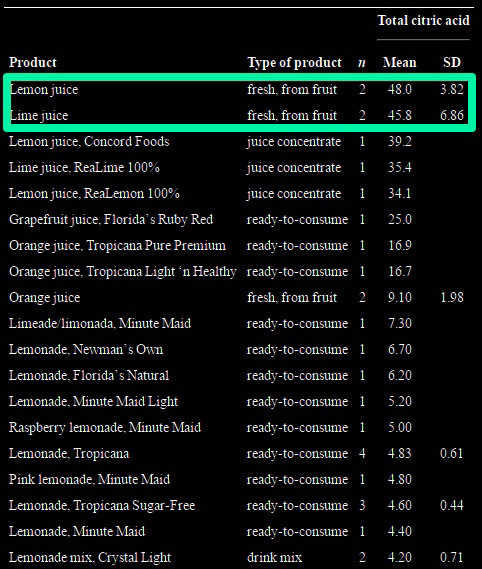
Image 1 Caption: Citric Acid Content, in (Grams per Liter) and in Descending Order, of Various Citrus Fruit Juices and Juice Formulations Commercially Available.
Food industry uses citric acid as a preservative or as an additive when they need to prolong the shelf life of some product or add bitter taste to the foods.
Now the question is…
Is citric acid from the lemon good or bad for you?
It is neither good nor bad, although indirectly, it has powerful cleansing properties (see below).
An interesting fact is that your body can produce some amounts of citric acid on its own. This citric acid takes part in the metabolic processes of energy production.
Citric acid as additive is a completely different story. You may think it comes from lemons, as it used to be in the past. Today, however, the industry gets citric acid from black mold ( too much black mold poses health risks from spore inhalation). So read the labels avoid man-made citric acid in processed foods.
The other very abundant nutrient in lemon juice is the most famous vitamin:
Vitamin C
Lemons are notorious for Vitamin C. In fact, I was taught to believe the word “lemon” was a synonym for Vitamin C.
When you have a cold, you are supposed to squeeze a lot of lemons… equals Vitamin C… equals stronger immunity. Right?
Indeed, lemons are very high in Vitamin C or ascorbic acid. Vitamin C is a powerful chemical that helps fight various diseases.
Here is the USDA info on the amount of Vitamin C in lemon juice. (30 mg is one half of the RDA, but according to some sources, RDA should be much higher)
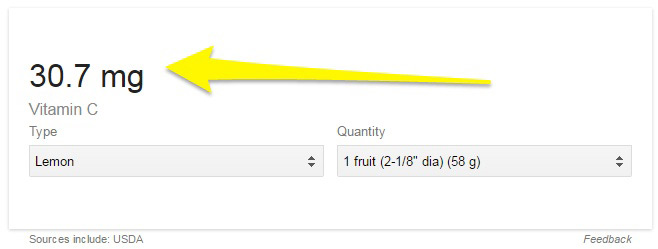
Alternative name for Vitamin C is ascorbic acid. You might be familiar with this term if you buy Vitamin C supplements in a pharmacy.
Vitamin C is among the most powerful antioxidant that we know of. In particular this vitamin:
- boosts the immunity of your body,
- diminishes the harmful action of the free radicals,
- prevents the development of atherosclerosis,
- and helps you fight diseases, such as rheumatoid arthritis and osteoarthritis.
Besides Vitamin C, lemon juice is pretty decent source of folate. And there are also some important minerals.
Essential Minerals in Lemon Juice
Lemon juice is particularly rich in calcium, magnesium, and potassium.
Still, don’t be too enthusiastic about supplying your body with these important minerals just from lemon juice. Their concentration is not that high, so you would have to rely on additional sources.
Especially pay attention to magnesium. It’s lacking in our standard diet, and you won’t get it from lemon juice only.
So either you are going to eat additional magnesium rich food, or supplement with magnesium on a daily basis.
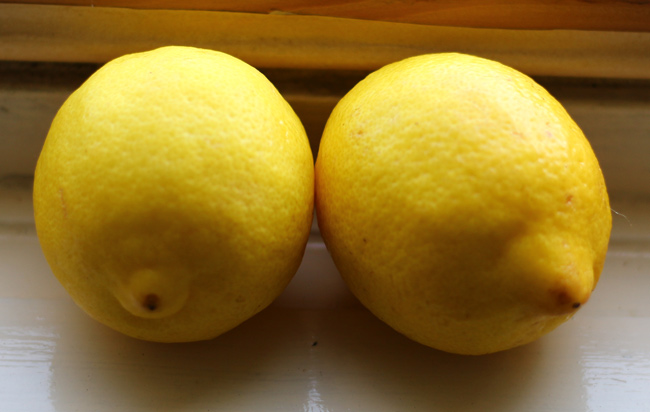
Phytonutrients in Lemon Juice
Lemon and lime juice are also rich in bioflavonoids that have the following properties:
- anti-microbial,
- anti-biotic,
- anti-septic, and
- anti-cancer properties.
Two main classes of biological compounds found as active in lemon juice are glycosides and kaempferols.
Another important class of compounds is the limonoids. Their high bio-availability has been connected with fighting some types of cancers in humans.
By bio-availability in this case we mean that the limonoids are present in the human body for up to 24 hours after consumption.
That’s huge in terms of hours, with most of the other active compounds staying in our body 5 to 6 hours tops.
Cleansing and Weight Loss Properties
Lemon juice benefits the liver, and cleanses the body.
If you have a fatty liver, lemon juice can help.
The cleansing properties are believed to be due to the high citric acid concentration.
How is this cleansing supposed to happen?
Citric acid works by stimulating the liver and gallbladder to purge toxins. This cleansing, in turn, stimulates the body to break down stored fat.
You see, the end result seems to be losing weight… At least in theory.
Nevertheless, in recent years, this lemon juice cleanse and lemon juice diet have gained popularity.
If you are interested, check for example this review by Juliette Kellow.
This version involves drinking 4 cups of lemon juice a day, with lots of water and some added lemon peel in it. The “lemon water” is made from water, lemons, cinnamon or maple syrup and cayenne pepper. In some modifications of this diet, you are free to eat nuts, seeds, vegetables, fruits, yogurt, and fish.
Any Adverse Effects of Lemon Juice?
The only real exception to regular drinking of lemon juice is with those people who suffer from heartburn or mouth and stomach ulcers. In such cases, drinking lemon juice can cause irritation due to the acidic state of the juice before being metabolized in the body.
One common concern seems to be the high oxalate content in lemons.
Oxalates are natural organic acids also found in other foods besides lemons. They are bad if they accumulate in your body, as they may cause kidney stones, nutrient deficiency, and other problems.
But you have nothing to worry about. That is, if you peel your lemons.
The catch here is that the lemon peels are rich in oxalates, but the lemon juice in fact is not.
Moreover, lemon juice might even be beneficial for preventing kidney stone formation due to the presence of citric acid in the juice.
Another common concern is dehydration. And this might really be a problem if you drink a lot of lemon juice.
So, whenever you drink A LOT OF lemon juice, drink a lot of water too.
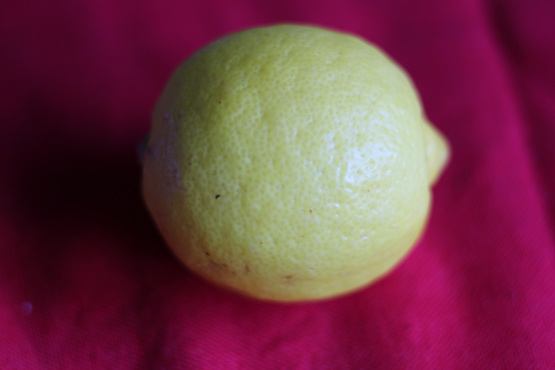
However, lemon juice taken in normal amounts along with plenty of water is very beneficial.
You might have heard that lemon juice can affect the enamel on teeth. While there’s some truth in this claim, the citric acid in the juice can damage the enamel only if you chew on lemons all the time.
Drinking lemon juice is safe and may even improve bad breath and help remove the plaque on teeth.
Some even say lemon juice causes cavities – no way.
If you drink more than two or three cups of lemon juice a day, be cautious of the detoxification symptoms including tiredness, headache, or bowel problems.
Healthy children under the age of 12 usually don’t need to drink lemon juice on a day-to-day basis. In case of cold, flu, or constipation, freshly squeezed lemon juice can help, but make sure you consult your pediatrician for any specific health problem before turning to home remedies.
Lemon Juice Acidic or Alkaline?
This is a very interesting dilemma and a source of some confusion.
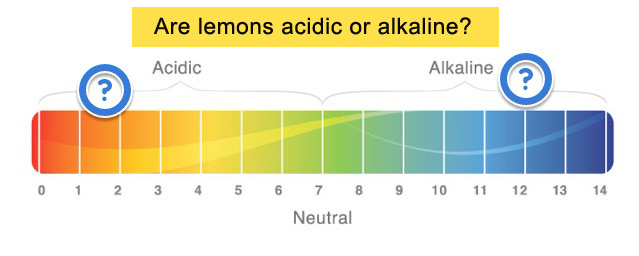
When I first heard about it, I was puzzled too.
So is it acidic or alkaline? This dilemma vanishes if we measure the lemon juice action outside and inside the body.
Outside, it is acidic, no question about it. You just have to taste the juice to be able to tell instantly.
Inside, after being metabolized, the effect of lemon juice is very much alkaline. This is great, because we want our body tissues to be as alkaline as possible.
Summary of the HEALTH BENEFITS of Lemon-Juice
- Reduces the levels of LDL or bad cholesterol
- Helps weight loss and cellulite tissue removal
- Helps fight “fatty” liver
- Helps maintaining mouth and teeth health
- Helps remove uric acid from the joints
- Reduces sweet cravings
- Detoxifies and helps fight diseases like rheumatoid arthritis, osteoarthritis, cancer, gout, diabetes type II, digestive disorders, and fatigue
- Nourishes and relaxes ligaments and connective tissue
- Maintains glowing, moisturized skin
My Favorite Lemon Juice Recipe
Making your own lemon juice is easy.
However, I have to warn you: this is a recipe for a freshly squeezed lemon juice, not canned or cooked lemon juice.
This kind of juice will be MUCH healthier than anything you can buy in a store.
Note that some people call this beverage lemon water, given that the juice itself is being diluted with water.
To my mind, pure lemon juice is simply too strong to be consumed without dilution.
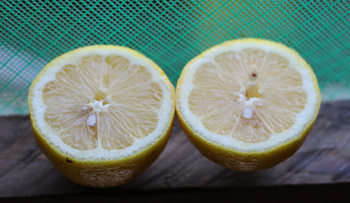
Selecting the Lemons
The only thing you should be paying attention to is selecting premium quality lemons (ORGANIC by all means), so that they will be slightly naturally sweet, and you won’t have to sweeten them by adding sugar or artificial sweeteners.
Selecting the lemons or limes is the most important step. Especially if you want to have lemon juice of superior quality.
Pick up larger lemons ad more attractive varieties if you can, but use only firm and unblemished lemons.
Buy them organic at the grocery store if you can, or visit your local farmer’s market.
Avoid packaged or pasteurized lemon juice. You may use them, of course, but they are simply not healthy and effective enough. You WON’T get nearly the same benefits.
If you absolutely have to use pasteurized bottled lemon juices try this (at least it’s organic, it doesn’t come from concentrate, and has no preservatives):
 How to Make Your Own Freshly Squeezed Lemon Juice Beverage
How to Make Your Own Freshly Squeezed Lemon Juice Beverage
Ingredients:
- 1 Lemon or 2 limes, organic are best, locally grown and organic even better.
- 1.5 cups clean filtered water or spring water – don’t use tab water unless there’s no other option.
Direction:
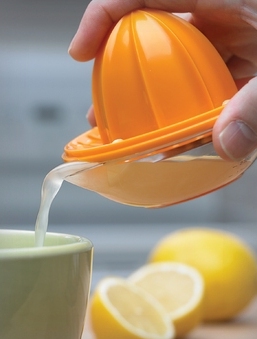 Wash the lemons in plain cold water. Cut them in half and squeeze them by hand. Obviously, you can use a squeezer, which makes the task much easier.
Wash the lemons in plain cold water. Cut them in half and squeeze them by hand. Obviously, you can use a squeezer, which makes the task much easier.
Collect the lemon juice in a container.
Use a strainer to filter the juice and mix it with water. That’s it.
Your fresh and healthy lemon juice (or lemon water) is ready.
If you absolutely insist on a sweet taste, add half a teaspoon of honey. Better not though.
If you find the juice too strong, dilute it with some more water to your taste.
Hot or Cold Water?
The best temperature of the water added to lemon juice is room temperature.
I know that some people prefer using warm water, especially in winter, but the downside is that warm water will destroy some of the enzymes in fresh lemon juice.
Lemon juice prepared with warm water might still be your healthiest warm drink, given all the other warm beverages, for example coffee.
The other extreme, ice cold water should be avoided as well. Even though your body will have to spend calories to heat up the water (believe it or not cold water is good for weight loss), the ice cold water will prevent the immediate digestive benefit of lemon juice.
Type of Water?
If you are preparing lemon juice for its health benefits, use quality water.
Either you use filtered water (free of contaminants) but with natural minerals, or purchase quality spring water (preferably in glass containers).
If you happen to live close to a spring, you don’t even have to pay for quality water.
How Much is Enough
People usually recommend one to two cups a day for cleansing the body (for example, one in the morning and the other in the afternoon).
However, please note that an average human body can metabolize one to one and a half cups of water at a time. Therefore, if you prepare too much lemon water, divide it into several portions and drink it gradually over time.
Other Uses of Lemon Juice
Other than drinking it, lemon juice has many uses in and around your house.
Lemon juice is a great addition to your salad dressings. I like to combine it with olive oil, crushed garlic, and vinegar (balsamic type).
If you are concerned about your salt intake (and even if you are not), lemon wedges served with meals can be a great substitute for salt because of their tartness.
A very tasty treat you can get if you squeeze some lime juice onto an avocado quarter and eat as is.
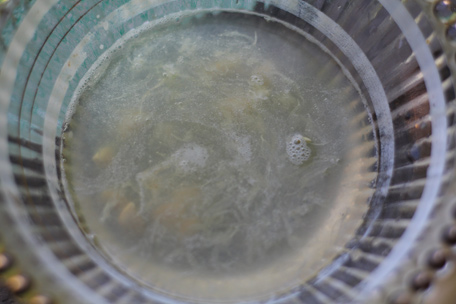
Some common household cleaners contain lemon juice. You can use it to remove stains and odors, to brighten copper cookware, or to scrub rust off metal.
Lemon juice is said to be an effective ant and insect repellent. I haven’t tried that though.
I didn’t know this up until a couple of days ago. Apparently, you could also use Lemon Juice to lighten hair. It is obviously a very natural way – you are avoiding chemicals and expensive treatments in the beauty salon. Here you can find are some directions as to how to do that at home.
Frequently Asked Questions
Is lemon juice a diuretic?
Diuretics are substances that help remove water from your body. There are some natural diuretics, but lemon or lemon juice in sadly not on this list. The foods that are diuretics include parsley, leafy greens, onions, garlic, asparagus, corn silk, cranberry juice, and pumpkins.
Can lemon juice lighten hair?
Yes, definitely can. Check the paragraphs above for more about lightening hair with lemon juice.
What is the pH of lemon juice?
About 2, the same as vinegar. Less is more acidic; orange juice and soda have 3. It is highly acidic outside of the body, but very much alkaline inside the body. Check the above section on lemon juice acidity.
What is the Best Type of Commercial Lemon Juice?
I really don’t know. I don’t use them at all. If it’s commercial, then it has to be pasteurized. The pasteurization will diminish the health benefits. If you absolutely have to use them, then go for
a) an organic brand, and
b) real juice not produced by using concentrates
For example, you may want to try the Lakewood brand:
The Bottom Line
If you are asking me which fruit juice to drink, Lemon or lime juice would be among the top 3.
Not only will it help you remove various metabolic wastes, but it will help you alkalize the body, and control the spread of bacteria and viruses.
As a side effect, it will help you cleanse and detoxify, lose some weight, and it is very refreshing.
References
Phytochemical analysis of lemons
Lemon juice and kidney stones prevention




I am trying to find out the quantity of bioflavonoids in lemons. I read over and over lemons are high in bioflavonoids, but I need to take 1 gram daily as my broken bones heal. I thought natural would be best as apposed to a supplement. I realize tho sometimes that isn’t practical. Do you know any specific quantity of bioflavonoids attributed to one lemon?
The bio-flavonoids found in lemon include hesperidin, naringin, naringenin, quercetin, diosmin, and rutin. These flavonoids help the absorption of Vitamin C (also present in lemon) and increase its biological action.
Here is the actual amount of some of the flavonoids present in 100 grams of raw lemons without the peel:
27.90 mg –> Hesperetin
0.55 mg –> Naringenin
2.29 mg –> Quercetin
Source: http://nutrition.merschat.com/foods-by-nutrient.cgi?Nutr_No=759
There is also 53.00 mg of Vitamin C or ascorbic acid in 100 grams of raw lemon.
Please note that much larger quantities of these bioflavonoids, are present in the rind. If you can find your lemons organic, you can safely consume them with the rind, but probably not raw.
Of course, natural is much better than a supplement. For example, synthetic ascorbic acid can be much less effective as it lack the bioflavonoids that protect it from oxidation.
Then again, if you choose supplements, the amount of flavonoids can be quite large. For example this product offers 1000 mg of Hesperetin and Rutin combined. So both approaches have their strengths and waknesses.
Hope this helps.
This post about the health benefits of Lemon Juice is really a great juice explanation..
Thanks for reading Joe.
StamiMax Drinking adequate amount of water is important to ensure that the body is hydrated. In case you are dehydrated your metabolic rate drops and makes it tough to drop a few pounds. The tour begins with you parking at Union Street and Octavia Roads. Start your day by checking out Bay Area BootCamp at Union Street Suite. http://jackedmuscleextremeadvice.com/stamimax/
Power Juicer Quality in juicers is no laughing procedure. Target a juicer that you can pay for of course but also look for reviews regarding juicer. You wish a juicer that is quiet highly efficient as well as easy to wash. Having a quality juicer will make juicing a good deal enjoyable finally. Some people whom extract choose to fruit juice wheat grass. https://www.r-quickshop.com/product-category/home-and-kitchen/juicers/